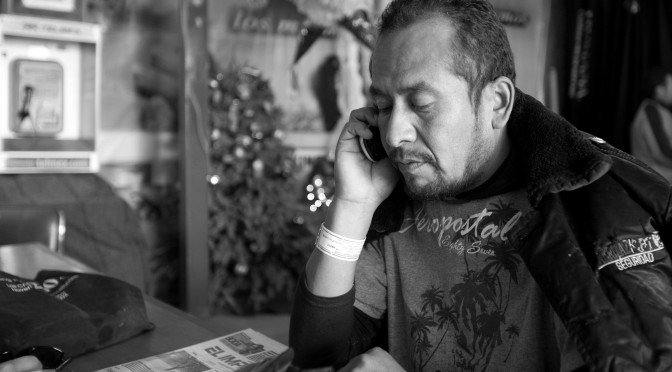This article by Nancy Myers appears in our fall newsletter.
Shortly after No More Deaths began going into the desert to help rescue migrants 11 years ago, legal-team member Margo Cowan, with help from Maryada Vallet and other volunteers, realized that something needed to be done to help deported migrants. Each day, hundreds were dumped across the border into Mexico with no possessions, identification, or money, and often injured, hungry and thirsty.
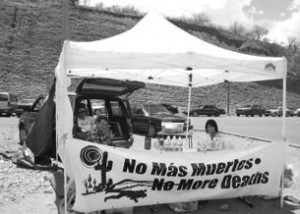
Many, including women and children, were dropped off in the middle of the night. Families were separated and their belongings and money were either stolen or lost somewhere in the criminal justice process.
Working with the Mexican authorities from the state of Sonora at the border, NMD started a massive emergency volunteer effort in 2006. Volunteers set up a tent to offer first aid, coffee, food, water and a chance to rest and make a phone call. They gathered donated clothing, food, water and medicine. A Cruz Roja (Red Cross) mobile unit, a trailer holding supplies, and a makeshift soup kitchen were all part of the evolving endeavor.
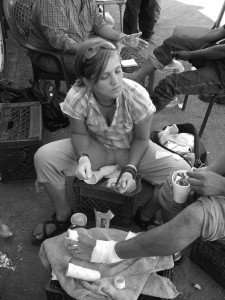
Along with providing humanitarian aid, volunteers also documented migrants’ experiences in custody, and two years later, the Abuse Documentation Project produced its first report, Crossing the Line.
In 2008, the Nogales group took on another project, called the Pertenencias Project, to help migrants get their belongings back. Working with the Mexican Consulate and lawyers assigned to migrants going through Operation Streamline, volunteers took many steps to reconnect people with their property after they had been arbitrarily separated from it.
The phone-call service, allowing people in crisis to communicate with their families in Mexico, the US or Central America, became our core Nogales service.
As government officials came and went, and drug cartels started interfering with the migrants, the first aid tent became unsafe. The volunteers felt vulnerable and frustrated because coyotes were soliciting migrants. At the same time, other community efforts arose to provide aid to migrants. So NMD began providing phone calls and first aid at Grupos Beta, a Mexican government aid base, and a privately owned bus transportation center.
The phone-call service, allowing people in crisis to communicate with their families in Mexico, the US or Central America, became our core Nogales service. For a time, NMD supported two or three long-term volunteers to live in Nogales, Arizona while doing this work.
The Kino Border Initiative, a Catholic organization, had opened the Centro de Atención al Migrante Deportado (Aid Center for Deported Migrants), a safe dining space, in 2009. From the beginning, NMD actively supported this project, informally known as the “comedor.”
In 2013, NMD volunteers noticed that many deportees who had been incarcerated had their money returned in a check they could not cash in Mexico. They developed multiple strategies for helping them recover this money.
People come into the comedor with injuries or illnesses, fear, and stories of kidnapping, abuse by authorities and missing family members. Many need their money or personal belongings returned. A couple of years ago, NMD arranged with KBI to provide phone calls and other services there. Currently, Samaritans from Tucson and Green Valley and NMD volunteers travel to the comedor daily.
In 2013, NMD volunteers noticed that many deportees who had been incarcerated had their money returned in a check they could not cash in Mexico. They developed multiple strategies for helping them recover this money, including arranging for a new check to be issued by the prison in the name of No More Deaths so that it could be cashed in the United States. Volunteers provide this “check-cashing” service to up to ten people a day.
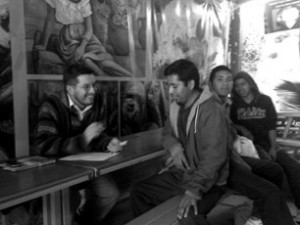
During the past year, in addition to deportees, more Hondurans, Guatemalans, and Salvadorans arrived heading north. Usually they hadn’t talked to their family for a month or more as they traveled through Mexico. Often they arrived with injuries from weeks spent on top of trains or at the hands of bandits or drug cartels.
Many speak good English from living in the United States. They come with a small piece of paper or notebook with a few phone numbers and little else, hoping to find relatives in California, New York, Florida and other far-flung places.
Whether they connect with family north or south of the border, the conversations are always emotional, often tearful, for them and the volunteers. NMD has helped hundreds of people make a phone call in the last 12 months.
If you want to join the effort or donate, visit www.nomoredeaths.org.
Read next story:
One year in sanctuary: Community stands with Rosa
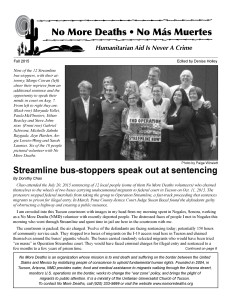
Featured photo: After being forcibly repatriated to Mexico, a man uses the No More Deaths phone service to contact family members. Photo by Bob Torres.

